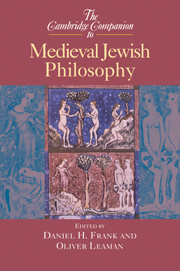Book contents
- Frontmatter
- PART I BACKGROUND AND CONTEXT
- PART II IDEAS, WORKS, AND WRITERS
- PART III THE LATER YEARS
- 15 The impact of Scholasticism upon Jewish philosophy in the fourteenth and fifteenth centuries
- 16 Jewish philosophy and the Jewish-Christian philosophical dialogue in fifteenth-century Spain
- 17 Hasdai Crescas and anti-Aristotelianism
- 18 The end and aftereffects of medieval Jewish philosophy
- Guide to further reading in English
- Index
17 - Hasdai Crescas and anti-Aristotelianism
from PART III - THE LATER YEARS
Published online by Cambridge University Press: 28 May 2006
- Frontmatter
- PART I BACKGROUND AND CONTEXT
- PART II IDEAS, WORKS, AND WRITERS
- PART III THE LATER YEARS
- 15 The impact of Scholasticism upon Jewish philosophy in the fourteenth and fifteenth centuries
- 16 Jewish philosophy and the Jewish-Christian philosophical dialogue in fifteenth-century Spain
- 17 Hasdai Crescas and anti-Aristotelianism
- 18 The end and aftereffects of medieval Jewish philosophy
- Guide to further reading in English
- Index
Summary
INTRODUCTION: FOURTEENTH-CENTURY PHYSICS
The fourteenth century saw the emergence of a new trend in medieval philosophy and science. While continuing to adhere generally to an Aristotelian understanding of nature, Christian scholars began to question and modify certain premises of Aristotelian physics and to suggest non-Aristotelian alternatives, reviving pre-Socratic or Hellenistic views and developing original ideas based on observation and experience. Such remarkable figures as Thomas Bradwardine and his successors in Oxford, and Jean Buridan and his students in Paris challenged basic Aristotelian tenets about infinity, place, vacuum, motion, and material substance, suggesting the possibility of an infinite cosmos filled by multiple worlds. Although motivated largely by Christian doctrine and the condemnations of Aristotle, this move towards critical inquiry led to a new conception of the universe, which anticipated and contributed to the scientific revolution of the sixteenth and seventeenth centuries.
The outstanding Jewish representative of this critical trend in European philosophy was Hasdai Crescas (c. 1340–1410/11), legal scholar, communal leader, and courtier in Barcelona and Saragossa. Perhaps influenced by the Paris physicists, and motivated by similar theological interests, Crescas in his Light of the Lord subjected Maimonides’ summary of Aristotelian physics to a searching attack. Unlike his Christian counterparts, however, Crescas was not content merely to speculate about problem areas within a generally coherent natural science.
- Type
- Chapter
- Information
- The Cambridge Companion to Medieval Jewish Philosophy , pp. 391 - 413Publisher: Cambridge University PressPrint publication year: 2003
- 4
- Cited by



